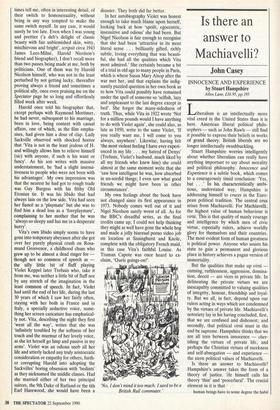Is there an answer to Machiavelli?
John Casey INNOCENCE AND EXPERIENCE by Stuart Hampshire
Allen Lane, £16.95, pp.195
Liberalism is an intellectually more vital creed in the United States than it is here. American liberal political philo- sophers — such as John Rawls — still find it possible to express their beliefs in works of grand theory. British liberals are no longer intellectually swashbuckling.
Stuart Hampshire worries intelligently about whether liberalism can really have anything important to say about morality and political philosophy. Innocence and Experience is a subtle book, which comes to a courageously timid conclusion: 'Yes, but . . .' In his characteristically ambi- tious, understated way, Hampshire is addressing himself to cruces in the Euro- pean political tradition. The central crux arises from Machiavelli. For Machiavelli, the highest value of human behaviour is virtu. This is that quality of manly courage and intelligence by which men of civic virtue, especially rulers, achieve worldly glory for themselves and their countries. The most evident form of human greatness is political power. Anyone who assists his state to gain a permanent and glorious place in history achieves a pagan version of immortality.
But the qualities that make up virtil — cunning, ruthlessness, aggression, domina- tion, deceit — are vices in private life. In delineating the private virtues we are inescapably committed to valuing qualities of integrity, honour, friendship and loyal- ty. But we all, in fact, depend upon our rulers acting in ways which are condemned by the virtues of private life. Machiavelli's notoriety lay in his having concluded, first, that we are confused and dishonest; and secondly, that political virtu must in the
end be supreme. Hampshire thinks that we are all torn between innocence — cher- ishing the virtues of private life, and perhaps the Christian virtues of meekness and self-abnegation — and experience — the stern political values of Machiavelli.
Is there an answer to Machiavelli? Hampshire's answer takes the form of a theory of justice. He himself calls his theory 'thin' and 'procedural'. The crucial element in it is that human beings have to some degree the habit of balancing contrary arguments and of drawing conclusions from them. Minimum justice is the elaborate application of this habit to interpersonal relations, entailing fair rules of procedure.
The thinness of Hampshire's theory is masterly. He sees the force of the argu- ments which have been brought against John Rawls' hugely influential book, A Theory of Justice. Rawls defines justice (in Hampshire's words) 'only as this concept is used in a liberal and democratic society'. Social groups who are guided by ideas of tradition (particularly religious tradition), or of the value of inherited customs and traditions, will not find that Rawls's account of justice fits their intuitions. They may not, for instance, accept the liberal premise of the supreme value of the autonomy of the individual.
Hampshire wants a theory of justice that does not presuppose any substantial values. And he thinks he has found it in the habit human beings have of balancing contrary arguments, and of being pretty reasonable in their procedures, if not in their conclusions. He seems to be appeal- ing to something very like Aristotle's phro- nimos — the man of practical wisdom. Aristotle thought that we cannot really define the good for man in some purely abstract way. The human good will be the sort of thing that the man of practical wisdom is disposed to choose. And the man of practical wisdom has virtues of deliberation — procedural virtues.
I am not sure that this will do the work Hampshire wants it to do. Is there any political system that it rules out? Hamp- shire's chosen example is the obvious one. The Nazis, he argues, wanted to destroy in Germany both the morality of literacy and of legality, and the morality of fair negotia- tion. All the Nazis wanted was the excite- ment of conflict and of victory through violence. These were certainly among the things the Nazis wanted. But were they all they wanted? Did they not also want
Germany to be a world power, with a land empire in the East? They thought they
were superior to the Slays. They thought that their empire would have the greatness, the glory that Machiavelli believed was the highest value in politics.
No doubt they were wrong. But there was enough that was comprehensible in Nazi territorial ambitions — enough that went beyond the madnesses of violence for its own sake, or of anti-Semitism — to prevent Nazism's being uniquely vulner- able to the theory of minimum procedural justice. Napoleon and Stalin balanced con- trary arguments, and drew conclusions from them. Napoleon balanced the shamefulness of murdering the Duc D'Enghien against the advantages to be gained from it. Stalin saw that private farmers would never co-operate with the Soviet State, and correctly drew the con- clusion that collectivisation, achieved through mass terror was the only way to preserve Communist power. Perhaps these examples suggest that despots do indeed have the habit of balancing arguments — but not in the way in which we characteris- tically do this in private life. They do not, indeed, elaborately apply this reasoning to interpersonal relations. This is because their ambitions are different. And that was precisely the conclusion to which Machi- avelli came.
But even if this account of justice does not quite work, it does impressively raise the right questions. So does the book as a whole. Hampshire writes with a wonderful fastidiousness — a fastidiousness that could almost be part of his understanding of justice.
Hampshire writes of the parts of the soul. He argues against the Aristotelian and Kantian picture of practical reason as the dominant power in the soul, controlling and directing emotions and desires. He suggests — not very persuasively — that this picture of the soul expresses a political hierarchy. More interestingly, and invok- ing Vico, he is arguing for a place for emotions, desires, personal and cultural peculiarities that is a philosophical version of liberal pluralism. This is a richly sugges- tive, civilised book. Hampshire is one of the most imaginative philosophers writing today. I think that he wants his readers to share a vision, rather than to assent to conclusions.



































































 Previous page
Previous page